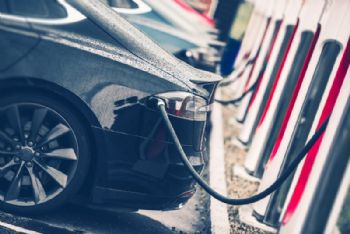
Within the UK, construction accounts for 50% of all carbon emissions produced by machinery and production, but the industry is starting to change and recognise the problems of pollution and the long-term threat it poses to the planet.
The UK Government, sensitive the issue, is beginning to pass legislation that stipulates construction firms should use green practices within their production processes — and this includes the introduction of a cleaner commercial van and truck fleet.
The Government is increasingly encouraging the use of electric vehicles across the UK. Even more so now that diesel and petrol cars have been branded significantly harmful to the environment.
With air pollution levels high throughout the UK, the Government has committed to plans to ensure it reduces the level of pollution by 2040.
For business owners, a fleet of reliable vehicles is a vital cog in the smooth running of their business. However, electric vehicles (EVs) have a level of stigma attached — a smaller mileage range, longer time taken to recharge and less charging points than petrol stations. It can seem like the best solution is to keep running with a petrol or diesel fleet.
However, with significant developments in the electric vehicle market, and as plans from the Government begin to roll out around the country, now could be the perfect time to start making the transition to electric or hybrid engines.
A spokesperson for Van Monster, a retailer of
used vans, says: “Back in 2013, the EV market was witnessing slow progression, with just 3,500 new registrations in total.
“However, 2017 was a record breaking year for the market, experiencing over 4,000 new registrations per month! Progress is expected to continue throughout 2018 with the air pollution implications very much in the spotlight — ignorance and a lack of knowledge is no longer an excuse.
“The end of 2017 marked approximately 132,000 new electric car registrations and over 5,100 electric vans. This could be attributed to the government’s plans to clean up the UK’s air quality.
“Some of the success can be attributed to the fact that there is now more choice available for van buyers.
“In previous years, there has been a limited choice for electric van drivers but now, most big automotive brands that have a recognisable name in the electric vehicle market, have a van counterpart on the market — Nissan, Renault, Peugeot, and Mercedes, to name a few.”
The EV market has been the subject of much criticism since its introduction. The number of charging points, the time it takes to charge and the mileage range have always been challenges for the market.
However, new developments suggest that the market could have finally beaten some of the challenges.
An issue for many drivers is how long it takes to recharge the electric battery. Currently, the fastest way to to do this is at a rapid charging point which around 20 minutes.
However, more of these rapid charging points are required to keep up with the demand and appeal to drivers who need a quick charge.
Thanks to a multi-million pound deal with ChargePoint back in May 2017, InstaVolt is installing at least another 3,000 rapid charging points across fuel station forecourts in the UK.
In addition, researchers claim they could have developed an ‘instantly rechargeable’ method that recharges an electric battery in the same time as it would take to fill a gas tank — a solution to the biggest headache of electric vehicles.
Nissan’s new Leaf, which can travel double the mileage on one charge, indicated that the industry could be within reach of overcoming the limited mileage range industry-wide. It is a significant indicator that the same might be in the pipeline for its electric van counterpart.
Petrol and diesel cars are forecast to be banned by 2040, but in the meantime, many initiatives to reduce air pollution in some of the most polluted areas in the UK are being introduced.
London and Oxford are among cities that are introducing Ultra Low Emission Zones and Zero Emission Zones to improve their air quality.
Oxford plans to be the first zero emission city in the world by 2020. Other cities, such as Leeds, Southampton and Derby, are also amongst the cities that plan to introduce clean air zones in their city centres.
Clean air zones, which will predominantly be in the city centres of the most polluted regions, will enable authorities to charge drivers a daily access charge, if they don’t abide by the zone’s emission standards.
Failure to pay daily toxin charges can result in a penalty being issued to the driver or registered owner of the vehicle.
Although, it has not yet been announced what these zones will mean for commercial vehicles right now, in the near future, it is likely that the charges will be applied to all vehicles.
Introducing electric vans to your fleet is the first step to avoiding being affected by the toxin charges. An ultra low emission or zero emission vehicle will be able to drive freely throughout the zones without daily charges.